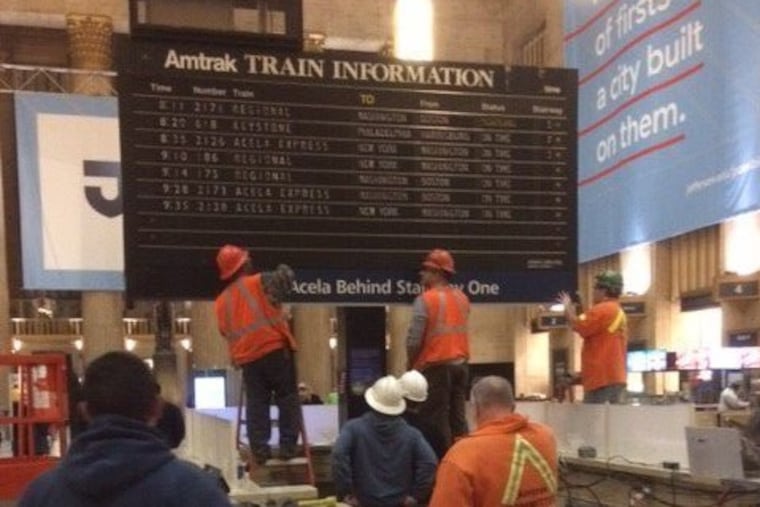Work begins on bringing down Amtrak’s iconic flipboard
But there's still hope that a compromise can be worked out.

Amtrak crews began preparations Thursday night to take down the clacking, 1970s-era analog schedule board from 30th Street Station, which will be replaced this weekend with a temporary digital screen.
U.S. Rep. Brendan Boyle, a Democrat who represents Northeast Philadelphia and parts of North Philadelphia, and has been advocating for a modern version of the split-flap sign, said he was told that the digital screen may be temporary. At his urging, Amtrak has been exploring the possibility of replacing the old sign with a modern split-flap board that could provide real-time train information.
Late Thursday, after the website Billy Penn posted images of workers in orange vests cordoning off the area just beneath the flipboard, Amtrak issued a statement saying the temporary digital screen would be supplemented by Amtrak staff, who will be on hand to direct customers.
The statement also said its new “Passenger Information Display System” would be completed in late February. The statement, however, did not describe what that system would be.
Last fall, railroad officials announced that the black-and-white schedule board would be taken down sometime in January. Boyle said that Amtrak officials alerted him Thursday that the swap would begin over the weekend, when Philadelphia’s main train station is less busy.
Although the sign has obvious functional issues, Amtrak’s decision to replace it with a digital screen disheartened many Philadelphians, who consider it a local fixture. Built by Italy’s Solari company, the sign is also revered as a design icon. Solari boards were once standard in train stations around the world, but the Philadelphia sign is the last working split-flap sign in Amtrak’s system.
Amtrak began replacing the split-flap boards with digital screens after it became clear that the old signs could not satisfy the requirements of the Americans With Disabilities Act. Since Solari boards do not have the capacity to provide detailed real-time information about train delays, they discriminate against people who are unable to hear Amtrak’s audio announcements.
While the existing board may not meet federal standards, there are newer versions that can. At Boyle’s urging, Amtrak officials met with the owners of Oat Foundry, a Philadelphia company that manufactures modern flipboards that can be fully integrated with Amtrak’s information software.
Mark Kuhn, the company’s chief executive, said he had met several times with Amtrak officials over the last month.
“We sent them all our technical information, and they are now vetting it with their IT people,” he said Thursday. “We’re going to make a business case for it. It will have to go through the meat grinder, but I still feel optimistic.”